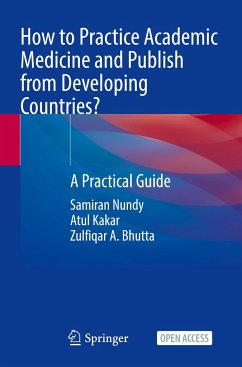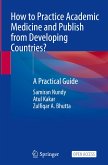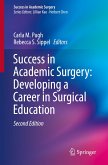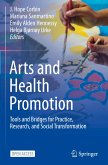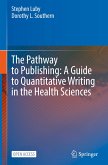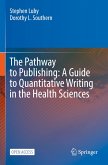Samiran Nundy, Atul Kakar, Zulfiqar A. Bhutta
How to Practice Academic Medicine and Publish from Developing Countries?
A Practical Guide
Samiran Nundy, Atul Kakar, Zulfiqar A. Bhutta
How to Practice Academic Medicine and Publish from Developing Countries?
A Practical Guide
- Broschiertes Buch
- Merkliste
- Auf die Merkliste
- Bewerten Bewerten
- Teilen
- Produkt teilen
- Produkterinnerung
- Produkterinnerung
This is an open access book.
The book provides an overview of the state of research in developing countries - Africa, Latin America, and Asia (especially India) and why research and publications are important in these regions. It addresses budding but struggling academics in low and middle-income countries. It is written mainly by senior colleagues who have experienced and recognized the challenges with design, documentation, and publication of health research in the developing world. The book includes short chapters providing insight into planning research at the undergraduate or…mehr
Andere Kunden interessierten sich auch für
![How to Practice Academic Medicine and Publish from Developing Countries? How to Practice Academic Medicine and Publish from Developing Countries?]() Samiran NundyHow to Practice Academic Medicine and Publish from Developing Countries?40,99 €
Samiran NundyHow to Practice Academic Medicine and Publish from Developing Countries?40,99 €![Success in Academic Surgery: Developing a Career in Surgical Education Success in Academic Surgery: Developing a Career in Surgical Education]() Success in Academic Surgery: Developing a Career in Surgical Education52,99 €
Success in Academic Surgery: Developing a Career in Surgical Education52,99 €![Arts and Health Promotion Arts and Health Promotion]() Arts and Health Promotion53,49 €
Arts and Health Promotion53,49 €![Building Your Academic Research Digital Identity Building Your Academic Research Digital Identity]() Building Your Academic Research Digital Identity25,99 €
Building Your Academic Research Digital Identity25,99 €![The Pathway to Publishing: A Guide to Quantitative Writing in the Health Sciences The Pathway to Publishing: A Guide to Quantitative Writing in the Health Sciences]() Stephen LubyThe Pathway to Publishing: A Guide to Quantitative Writing in the Health Sciences53,49 €
Stephen LubyThe Pathway to Publishing: A Guide to Quantitative Writing in the Health Sciences53,49 €![The Pathway to Publishing: A Guide to Quantitative Writing in the Health Sciences The Pathway to Publishing: A Guide to Quantitative Writing in the Health Sciences]() Stephen LubyThe Pathway to Publishing: A Guide to Quantitative Writing in the Health Sciences42,79 €
Stephen LubyThe Pathway to Publishing: A Guide to Quantitative Writing in the Health Sciences42,79 €![Ethics, Integrity and Policymaking Ethics, Integrity and Policymaking]() Ethics, Integrity and Policymaking41,99 €
Ethics, Integrity and Policymaking41,99 €-
-
-
This is an open access book.
The book provides an overview of the state of research in developing countries - Africa, Latin America, and Asia (especially India) and why research and publications are important in these regions. It addresses budding but struggling academics in low and middle-income countries. It is written mainly by senior colleagues who have experienced and recognized the challenges with design, documentation, and publication of health research in the developing world. The book includes short chapters providing insight into planning research at the undergraduate or postgraduate level, issues related to research ethics, and conduct of clinical trials. It also serves as a guide towards establishing a research question and research methodology. It covers important concepts such as writing a paper, the submission process, dealing with rejection and revisions, and covers additional topics such as planning lectures and presentations.
The book will be useful for graduates, postgraduates, teachers as well as physicians and practitioners all over the developing world who are interested in academic medicine and wish to do medical research.
Hinweis: Dieser Artikel kann nur an eine deutsche Lieferadresse ausgeliefert werden.
The book provides an overview of the state of research in developing countries - Africa, Latin America, and Asia (especially India) and why research and publications are important in these regions. It addresses budding but struggling academics in low and middle-income countries. It is written mainly by senior colleagues who have experienced and recognized the challenges with design, documentation, and publication of health research in the developing world. The book includes short chapters providing insight into planning research at the undergraduate or postgraduate level, issues related to research ethics, and conduct of clinical trials. It also serves as a guide towards establishing a research question and research methodology. It covers important concepts such as writing a paper, the submission process, dealing with rejection and revisions, and covers additional topics such as planning lectures and presentations.
The book will be useful for graduates, postgraduates, teachers as well as physicians and practitioners all over the developing world who are interested in academic medicine and wish to do medical research.
Hinweis: Dieser Artikel kann nur an eine deutsche Lieferadresse ausgeliefert werden.
Produktdetails
- Produktdetails
- Verlag: Professor Samiran Nundy / Springer / Springer Nature Singapore / Springer, Berlin
- Artikelnr. des Verlages: 978-981-16-5250-9
- 1st ed. 2022
- Seitenzahl: 512
- Erscheinungstermin: 24. Oktober 2021
- Englisch
- Abmessung: 235mm x 155mm x 26mm
- Gewicht: 861g
- ISBN-13: 9789811652509
- ISBN-10: 9811652503
- Artikelnr.: 62194897
- Herstellerkennzeichnung Die Herstellerinformationen sind derzeit nicht verfügbar.
- Verlag: Professor Samiran Nundy / Springer / Springer Nature Singapore / Springer, Berlin
- Artikelnr. des Verlages: 978-981-16-5250-9
- 1st ed. 2022
- Seitenzahl: 512
- Erscheinungstermin: 24. Oktober 2021
- Englisch
- Abmessung: 235mm x 155mm x 26mm
- Gewicht: 861g
- ISBN-13: 9789811652509
- ISBN-10: 9811652503
- Artikelnr.: 62194897
- Herstellerkennzeichnung Die Herstellerinformationen sind derzeit nicht verfügbar.
Dr. Samiran Nundy: Dr Samiran Nundy was a medical undergraduate in Cambridge and Guy's Hospital London and then trained in medicine and later in surgery at Guy's, Addenbrooke's Cambridge, the Hammersmith and the Massachusetts General Hospital in Boston. He has taught at the Universities of Cambridge, London and Harvard and returned to the All India Institute of Medical Sciences, New Delhi, India in 1975 where he eventually became Professor and Head of the department of Gastrointestinal Surgery. He left AIIMS in 1996 to start the Surgical Gastroenterology and Liver Transplantation department at Sir Ganga Ram Hospital, New Delhi. Dr Nundy's clinical and research interests are in the surgical management of diseases of the liver, bowel and pancreas, the quality of Indian medical research and publications, electronic medical records and disseminating health information to lay people via books, television and the web. He has written or edited 37 books and authored 236 research papers. He helped in lobbying for and drafting the Transplantation of Human Organs Act 1995. He has edited The National Medical Journal of India, Tropical Gastroenterology, the Indian Journal of Medical Ethics, DoctorNDTV.com and the web application Doctor Raxa and has served on 24 journal editorial boards including the British Medical Journal and The Bhutan Health Journal. He was till recently the Dean of the Ganga Ram Institute for Postgraduate Medical Education and Research, is the editor-in-chief of Current Medicine Research and Practice, co- chairman (with Prof. Zulfiqar Bhutta) of the editorial board of the BMJ South Asia and is on the board of trustees of Sir Ganga Ram Hospital. He has recently been appointed Adviser to the Governor of Meghalaya on how to improve health services in that state and is also the President of AIIMS, Rishikesh, India. Dr. Zulfiqar A. Bhutta: Dr. Zulfiqar A. Bhutta isthe Inaugural Robert Harding Chair in Global Child Health and Inaugural Ibn Sina Scholar in Global Child Health at the Hospital for Sick Children, Canada and co-Director of SickKids' Centre for Global Child Health, Canada. He is also the Founding Director of the Centre of Excellence in Women and Child Health and the Institute of Global Health and Development at Aga Khan University, across its campuses in South Central Asia, East Africa and United Kingdom. He holds adjunct professorships at universities including Johns Hopkins University, George Washington University and the London School of Hygiene & Tropical Medicine. Dr. Bhutta is a Distinguished National Professor of the Government of Pakistan, co-Chair of the Maternal and Child Health oversight committee of WHO EMRO, Chairman of the Coalition of Centres in Global Child Health, and a leading voice for health professionals supporting integrated maternal, newborn and child health globally. Dr. Bhutta leads large research groups in Toronto, Karachi and Nairobi with special interests in scaling up evidence-based, community setting interventions and implementation of RMNCAH&N interventions in humanitarian contexts. His work with community health workers influenced maternal and newborn outreach programs for marginalized populations internationally and his group's work with the WHO and PMNCH is guiding essential global intervention policies for women, children and adolescents. Dr. Bhutta obtained his MBBS from the University of Peshawar, Pakistan and his PhD from the Karolinska Institute, Sweden. He is a fellow of the Royal College of Physicians, the Royal College of Pediatrics and Child Health, American Academy of Pediatrics and the National Academy of Sciences, USA. In 2020 he was awarded the honour of Fellowship of the Royal Society, United Kingdom. He was awarded the Roux prize in October 2021, the highest global award for the use of evidence to impact globalpublic health. Dr. Atul Kakar: Dr. Atul Kakar is a graduate from University College of Medical Sciences, University of Delhi, India and has done his post-graduation in internal medicine, Diplomat of National Board. He has been awarded MRCP and FRCP from Royal College of Glasgow. He is an alumni of Ganga Ram Institute of Postgraduate Medical Education and Research, New Delhi, India. Currently he is the Vice Chairman and Teaching Coordinator of department of internal medicine, Sir Ganga Ram Hospital, New Delhi. He has also done EULAR certification course in rheumatic diseases and is the Secretary of Delhi Rheumatology Association. His area of interest besides rheumatology, includes HIV medicine. Dr. Kakar has been awarded eminent National Board of Examination (NBE) Alumnus Award, Dr. K.C. Mahajan Award for Best Academician and Smt Pawan Kumari Jain Oration Award for the Best Physician by Delhi State Chapter of Associations of Physiciansof India. He is the examiner for Royal College of Physicians & Surgeons, Glasgow, National Board of Examination and Khesar Gyalpo University of Medical Sciences, Bhutan. Dr. Kakar has written and edited many books, has 130 publications in national and international journals. He has been involved with many clinical drug trials as the Principal Investigator for rheumatoid arthritis, osteoporosis and amyloidosis. He is currently the Editor of Current Medicine Research and Practice.
Part 1 Introduction.- 1 Academic Medicine and the Social Determinants of Health.- Part 2 Background.- 2 Why should we publish papers?.- 3 Overcoming the initial barriers to publication and the role of mentors?.- 4 When should we start doing research and publishing papers?.- 5 Does research improve patient care?.- 6 The status of biomedical research in some developing countries.- Part 3 How to plan a study?.- 7 How to think of a research question?.- 8 What are the types of study design?.- 9 How to calculate an adequate sample size?.- 10 Understanding medical biostatistics.- 11 Applying biostatistics in medical research.- 12 Writing the research proposal: the art and the science.- 13 Ethics in research.- Part 4 How to write an original research paper?.- 14 Who should be an Author?.- 15 How to write an Abstract?.- 16 How to choose a Title?.- 17 How to write the Introduction to a scientific paper?.- 18 How to do a Review of the Literature?.- 19 How to write Material(Patients) and Methods?.- 20 How to write Results?.- 21 How to write the Discussion ?.- 22 How to Cite other papers and add References?.- 23 How to add Illustrations?.- 24 How to check for Plagiarism?.- 25 How to improve language and syntax in medical writing?.- Part 5 How to write other journal articles?.- 26 How to write an Editorial?.- 27 How to write a Letter to the Editor?.- 28 How to write a Case Report?.- 29 Systematic, Scoping and Narrative Reviews.- Part 6 After the paper is written.- 30 To which journal should you submit your article?.- 31 Publication algorithm.- 32 How to do a Peer Review?.- 33 How to handle Rejection?.- 34 Bibliometrics.- Part 7 What else you should know about publication?.- 35 Is medical publishing lucrative?.- 36 How to start a New Medical Journal?.- Part 8 How to project your work further?.- 37 How to present a Poster in a conference?.- 38 How to give an Oral presentation?.- Part 9 Education, planning and execution.- 39 Bedside teaching in Developing Countries.- 40 E-learning in the developing world.- 41 Develop learning objectives and evaluations-Multiple choice questions/ Objective Structured Practical Examination.- 42 How to prepare a lecture?.- 43 The Why and How of Problem based learning?.- 44 How to conduct a Journal Club?.- Part 10 Other topics.- 45 Medical records.- 46 Clinical Audit.- 47 Clinical Drug Trials.- 48 Ethics in Genetic Testing.
Part 1 Introduction.- 1 Academic Medicine and the Social Determinants of Health.- Part 2 Background.- 2 Why should we publish papers?.- 3 Overcoming the initial barriers to publication and the role of mentors?.- 4 When should we start doing research and publishing papers?.- 5 Does research improve patient care?.- 6 The status of biomedical research in some developing countries.- Part 3 How to plan a study?.- 7 How to think of a research question?.- 8 What are the types of study design?.- 9 How to calculate an adequate sample size?.- 10 Understanding medical biostatistics.- 11 Applying biostatistics in medical research.- 12 Writing the research proposal: the art and the science.- 13 Ethics in research.- Part 4 How to write an original research paper?.- 14 Who should be an Author?.- 15 How to write an Abstract?.- 16 How to choose a Title?.- 17 How to write the Introduction to a scientific paper?.- 18 How to do a Review of the Literature?.- 19 How to write Material(Patients) and Methods?.- 20 How to write Results?.- 21 How to write the Discussion ?.- 22 How to Cite other papers and add References?.- 23 How to add Illustrations?.- 24 How to check for Plagiarism?.- 25 How to improve language and syntax in medical writing?.- Part 5 How to write other journal articles?.- 26 How to write an Editorial?.- 27 How to write a Letter to the Editor?.- 28 How to write a Case Report?.- 29 Systematic, Scoping and Narrative Reviews.- Part 6 After the paper is written.- 30 To which journal should you submit your article?.- 31 Publication algorithm.- 32 How to do a Peer Review?.- 33 How to handle Rejection?.- 34 Bibliometrics.- Part 7 What else you should know about publication?.- 35 Is medical publishing lucrative?.- 36 How to start a New Medical Journal?.- Part 8 How to project your work further?.- 37 How to present a Poster in a conference?.- 38 How to give an Oral presentation?.- Part 9 Education, planning and execution.- 39 Bedside teaching in Developing Countries.- 40 E-learning in the developing world.- 41 Develop learning objectives and evaluations-Multiple choice questions/ Objective Structured Practical Examination.- 42 How to prepare a lecture?.- 43 The Why and How of Problem based learning?.- 44 How to conduct a Journal Club?.- Part 10 Other topics.- 45 Medical records.- 46 Clinical Audit.- 47 Clinical Drug Trials.- 48 Ethics in Genetic Testing.

